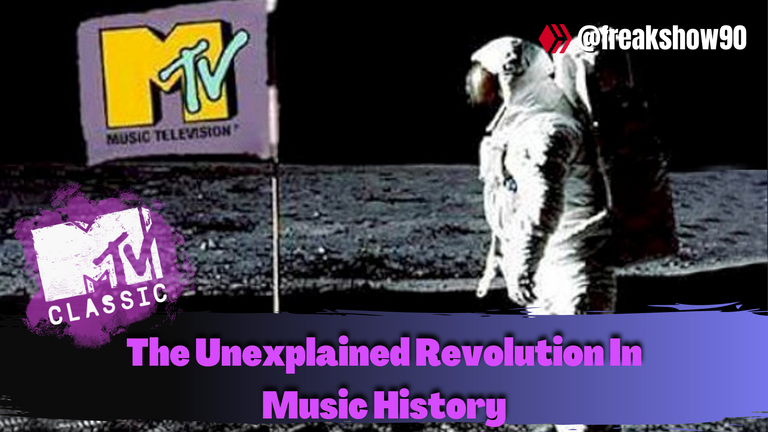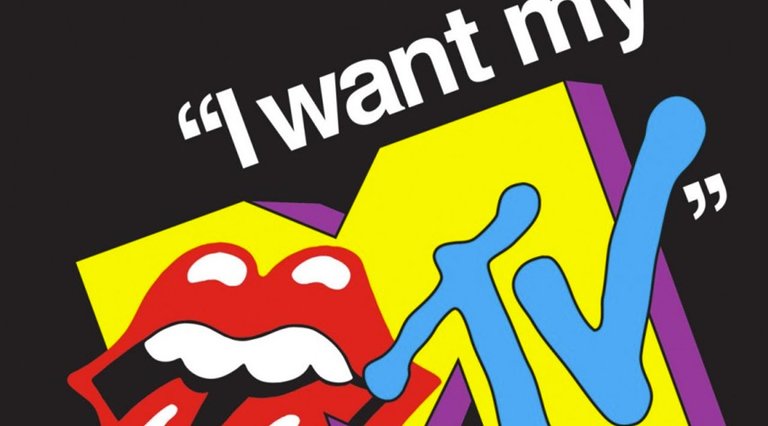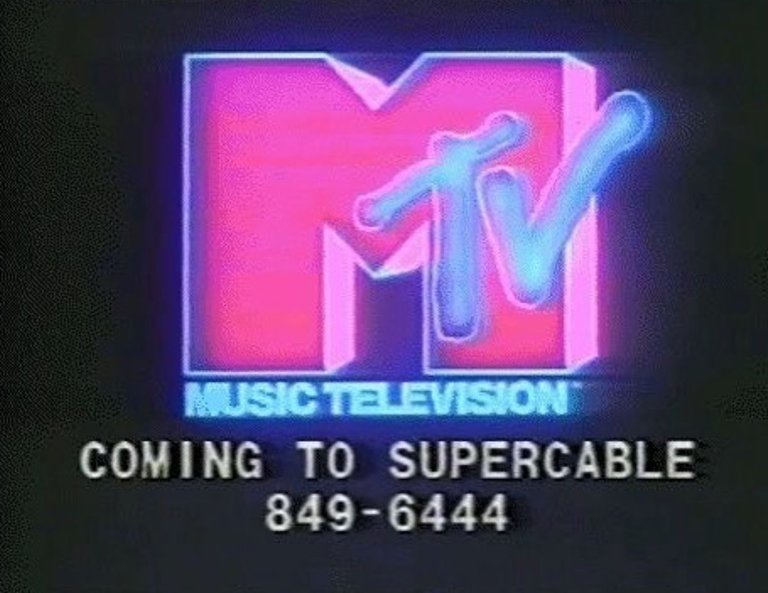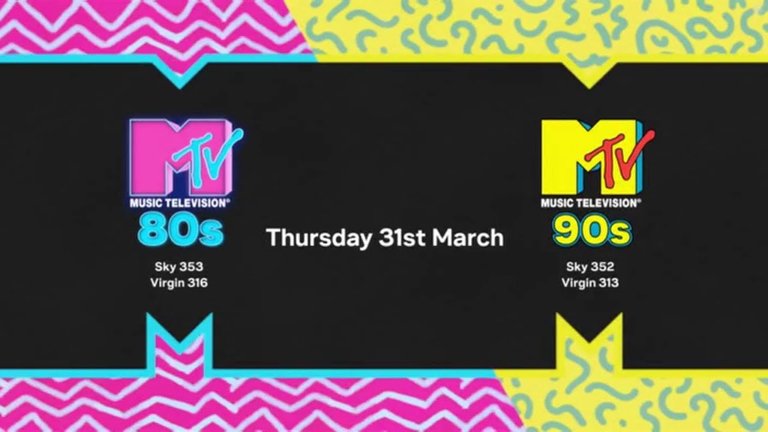MTV: The Unexplained Revolution In Music History [ENG/ESP]


"You will never look at music in the same way again". Perhaps no one can associate the words with which I began these lines. Perhaps, many of the things we see today, know and, above all, assume as something natural within all the music we consume (but which, in the end, was not always like that) and we forget that there was a time when, in order to get new bands, new sounds, new musical experiences, you had to be very lucky. Either because you could pay directly in a disco shop or, perhaps, because you were lucky enough to find a station (radio, not TV) that played music you liked... Well, all this, absolutely everything, changed (and forever) Music Television, or better known as: MTV.
1980 was the beginning of one of the most golden decades for contemporary music, but above all for the diffusion of styles, genres, cultures and the broad spectrum of artistic creations that we now enjoy as a matter of course. Those ten years, between 1980 and 1990, drastically changed the way we saw something as commonplace as music. The synthesizer appeared (characteristic of pop, rock and hip hop in the 80's), it was also one of the brilliant eras for punk rock, alternative, metal in general and pop as we recognise it today. Let's not forget that with Michael Jackson, and his unique but sophisticated video for "Thriller", the music video format changed forever. And the revolution started with a young Michael.
"No volverás a ver la música de la misma manera". Quizá nadie pueda asociar las palabras con las que inicié estas líneas. Quizá, muchas de las cosas que hoy vemos, sabemos y sobre todo, asumimos como algo natural dentro de toda la música que consumimos (pero que en definitiva, no siempre fue así) y olvidamos que hubo una época donde para poder obtener nuevas bandas, nuevos sonidos, nuevas experiencias musicales; pues tenías que tener mucha suerte. Bien sea porque pudieras pagar directamente en una disco tienda o, tal vez, porque tuvieras la fabulosa suerte de dar con una estación (de radio, no de televisión) que colocara música de tu agrado... Bueno, todo esto, absolutamente todo, cambió (y para siempre) la Music Television, o mejor conocida como: MTV.
1980 fue el inicio de una de las décadas más doradas para la música contemporánea, pero sobre todo para la difusión de estilos, géneros, culturas y la larga amplitud de espectro de creaciones artísticas de las que hoy solemos gozar con naturalidad. Esos diez años, comprendidos entre 1980 y 1990, cambiaron drásticamente como veíamos algo tan cotidiano como la música. Apareció el sintetizador (característico del pop, del rock y del hiphop de los 80's), también fue una de las épocas brillantes para el punk rock, lo alternativo, el metal en general y el pop tal cual lo reconocemos hoy en día. No olvidemos que con Michael Jackson, y su inigualable pero sofisticado vídeo de "Thriller" el formato de vídeos musicales cambió para siempre. Y la revolución empezó con un joven Michael.


But as talented, virtuous and obsessed as Jackson was with music in general (and I focus exclusively on this artist, just to name one that has been emblematic), he would not have been what he is today without MTV. Although what the renowned American 24-hour music channel was doing was neither novel nor pioneering, it did absolutely shatter the foundations of what was being done on television worldwide, and not just in the United States. These guys dictated the tempo of what was heard in the 5 continents. Without them, it would have been impossible to hear so many bands, especially groups and solo artists who were not particularly well known in the United States. The Police, The Smiths, Bob Marley, even Depeche Mode, are just some of the examples of what I am trying to explain.
And all of this is not a musical success for MTV either, it was due to the channel's own objective. Remember, by the 80's the saturation of the audience with programmes full of musical scholars, with a conservative and frankly boring editorial line, alienated more and more young people. Teenagers who preferred to read comics or were not interested in television (although generation "X" was the first generation that had consumed more audiovisual media than any other in the history of mankind), for this reason MTV set out to create a channel of entertainment, trends but above all excellent music with the aim of being the reference for hundreds of millions of young people around the world...
Pero por más talentoso, virtuoso y obsesionado que fuese Jackson con la música en general (y me enfoco exclusivamente en este artista por solo nombrar uno que haya sido emblemático) no hubiese sido lo que hoy es sin la MTV. Si bien lo que hacía el reconocido canal estadounidense de música, las 24 horas del día, no era ni novedoso ni pionero, no menos cierto es que sí dinamitó absolutamente todos las bases de lo que se hacía en la televisión mundial; ya no solo estadounidense. Estos tipos, dictaron el tempo de lo que se oía en los 5 continentes. Sin ellos hubiese sido imposible conocer de tantas bandas, especialmente de agrupaciones y solistas que no eran especialmente sonados en los Estados Unidos. The Police, The Smiths, Bob Marley, incluso Depeche Mode, son tan solo algunos de los ejemplos de lo que intento explicar.
Y todo esto, tampoco es un acierto musical de la MTV, se debía al propio objetivo del canal. Recuerden, que para los años 80's la saturación que tenía la audiencia por programas llenos de eruditos musicales, con una línea editorial conservadora y francamente aburrida, alejada cada vez más a los jóvenes. Adolescentes que preferían leer cómics o directamente no interesarse demasiado en la televisión, (aunque la generación "X" era la primera que había consumido más medio audiovisuales de comunicación que ninguna otra en la historia de la humanidad), por esta razón la MTV se propuso crear un canal de entretenimiento, tendencias pero sobre todo excelente música con el objetivo de ser la referencia para cientos de millones de jóvenes del mundo...


Looking back, many of the artists we think of as iconic would never have become what they are today without MTV. The question is how, and the answer is really quite simple. The big charts in the United States shone with artists like Madonna, Michael Jackson, Wham!, Queen, or Cindy Lauper, but to get on MTV it didn't matter where you were on the big music charts, what you really needed was a good video. Again, now do you see how relevant the video clip for "Thriller" was? But also that it wasn't that expensive. Because if you remember correctly, in order to get on the channel, the executives had to pay the bands or artists for it. If you charged too much, you didn't get on, and if you didn't get on, it was like you didn't exist...
It was that massive, overwhelming, absolutist, mass consumption model of MTV that helped smaller, relatively unknown bands in the United States succeed. Not to mention the explosion of the newly big wave of alternative music and Hip Hop on MTV. It was insane. RUN DMC, Tupac, MC Hammer, Public Enemy, Straight Outta Cottom, and a myriad of black artists from the recent new genre scene did whatever they wanted on the MTV programming grid. What's more, if you really think about it with a cool head, you can see (42 years in the future!) that almost every genre of modern music had a glorious era in the 80s. From rock, rap, soul, funk; obviously pop, and also electronica. All of them.
Mirándolo en retrospectiva, muchos de los artistas que creemos emblemáticos, jamás habrían llegado a ser lo que hoy son sin la MTV. La pregunta es ¿cómo? Y la respuesta es realmente sencilla. Las listas de los gran charts de Estados Unidos brillaban con artistas como Madonna, Michael Jackson, Wham!, Queen, o Cindy Lauper, sin embargo para sonar en la MTV daba igual tu ubicación en los puestos de las grandes carteleras musicales, lo que realmente se necesitaba es que tuvieras un buen vídeo. De nuevo, ¿ahora sí ven lo relevante del vídeo clip de "Thriller"? Pero también que no fuese tan costoso. Porque si mal no recuerdan, para poder emitir dentro del canal, los ejecutivos debían pagar a las agrupaciones o artistas por ello. Si cobrabas demasiado, no salías y si no salías, era como si no existieses...
Ese modelo de consumo masivo, abrumador, absolutista de la MTV fue lo que ayudó a las bandas más pequeñas y relativamente desconocidas en los Estados Unidos triunfasen. Y no hablar de la explosión que tuvo la recién gran oleada de la música alternativa y el Hip Hop dentro de la MTV. Fue una locura. RUN DMC, Tupac, MC Hammer, Public Enemy, Straight Outta Cottom, y una infinidad de artistas de la escena negra del reciente nuevo género hicieron lo que quisieron dentro de la parrilla de programación de la MTV. Es más, si se piensa realmente con mente fría, se puede ver (¡42 años en el futuro!) que casi todos los géneros de la música moderna tuvieran una época gloriosa en los 80's. Desde el rock, el rap, el soul, el funk; evidentemente el pop, y también la electrónica. Todos.

What I am telling you about was not exclusively due to the abilities of the artists' record companies in terms of publicity and marketing, nothing to do with it! It was as simple as paying (a small amount of money, or in many cases "free") to MTV to play compulsively. Another innovative aspect of the brand was the randomness of genres. In 30 minutes of on-channel consumption, you could start with Gloria Gaynor, then go to Poison/Motley Crue, then immediately after that Madonna's "Like A Virgin" and finish off (before the commercial break) with some Kate Bush.... It seemed crazy, but it was nothing like that... It was quite a logical decision. The idea behind it, I was just trying to show a variety of content but also to know what the audience liked.
That's how the preferences were born. The most marked styles, in that way the artists competed (without knowing it) within the MTV programming to see who was the best, who was the most repeated during the day; or directly the most requested within the famous 0-800-DIAL-MTV. For those of you reading this in 2022, it was a trick that MTV had to capture, by means of phone calls, all the requests that the people who consumed the channel's programming had. Just like Guns and Roses, suddenly, a new and unknown band supplants music greats like The Rolling Stones or Black Sabbath. And not to mention the success of totally unknown bands in the whole of the United States, with the exception of Seattle, as happened with Grunge...
Esto que les relato, no fue exclusivamente a la habilidades de la compañías discográficas de los artistas en cuanto a publicidad y marketing se debía, ¡nada que ver! Era tan simple como pagar (una cantidad baja de dinero, o en muchísimos casos "gratis") a la MTV para sonar compulsivamente. Otro aspecto innovador de la marca, fue la aleatoriedad de los géneros. En 30 minutos de consumo dentro del canal, podías empezar con Gloria Gaynor, luego ir por Poison/Motley Crue para inmediatamente después escuchar "Like A Virgin" de Madonna y culminar el rato (antes del corte publicitario) con algo de Kate Bush... Parecía una locura, pero nada que ver... Fue una decisión bastante lógica. La idea detrás, solo intentaba mostrar variedad de contenido pero también saber qué le gustaba al público.
Así como nacieron las preferencias. Los estilos más marcados, de ese modo los artistas competían (sin saberlo) dentro de la programación de la MTV para ver quién era el mejor, cuál era el más repetido durante el día; o directamente el más solicitado dentro del famosísimo 0-800-DIAL-MTV. Que para aquellos que lean esto en el 2022, era un truco que tenía la MTV para captar, por medio de llamadas por teléfono, todas las peticiones que tenían las personas que consumían la programación del canal. Así como los Guns and Roses, de repente, una banda nueva y desconocida, suplanta a grandes de la música como The Rolling Stones o Black Sabbath. Y ni hablar del éxito que tuvieron bandas absolutamente desconocidas en todo Estados Unidos, a excepción de Seattle, como sucedió con el Grunge...

CBS Radio, MSNBC, Billboard, and even Rolling Stone itself, had such a pronounced decline in their impact on the American population that it was simply never the same again. Suddenly, bands like Genesis, Run DMC, Aerosmith, Michael Jackson, Nirvana and Guns 'N' Roses were dominating music, along with hundreds of thousands of artists who simply revolutionised music forever.... It also helped break through the conservatism typical of the early decade with something as powerful as it was classic: freedom of action. You may ask, what is that? Well, Madonna (just to name one example) was censored for her famous song "Like A Virgin", the same MTV told Madonna, "don't worry, come with us to our awards and do whatever you want"... Whatever else I can say, it's totally redundant.
Come to think of it, even the media dissing was also a wonderful and visionary creation of MTV. The interviews between Dave Mustaine and the guys from Metallica are well known. Believe me when I say, I could seriously make this post long, long and rambling, explaining the true MTV revolution, but for now I will culminate with something we still take for granted today: the MTV Unplugged series. Nirvana, Pearl Jam, Alice In Chains, Kiss, Alanis Morissette, among many, many more artists as no one had ever seen them before, but above all; in a format that included an album in itself and that, looking at it from our current perspective, turned out to be an immeasurable success.
CBS Radio, MSNBC, Billboard, e incluso la mismísima Rolling Stone, tuvieron una merma tan pronunciada en sus efectos dentro de la población estadounidense, que sencillamente jamás volvió a ser igual. De repente, bandas como Genesis, Run DMC, Aerosmith, Michael Jackson, Nirvana y Guns 'N' Roses dominaban la música, junto a centenares de miles de de artistas que sencillamente revolucionaron la música para siempre... Además, también ayudó a romper con el conservadurismo típico de inicios de la década con algo tan poderoso cómo clásico: la libertad de acción. Ustedes se preguntarán, ¿qué es eso? Pues a Madonna (por solo nombrar un ejemplo) la censuraron por su famoso tema "Like A Virgin", la misma MTV le dijo a Madonna, "tranquila, ven con nosotros a nuestros premios y haz lo que quieras"... Lo demás que yo pueda decir, sobra totalmente.
Ahora que lo pienso, incluso las dispuestas mediáticas también fueron una creación maravillosa y visionaria de la MTV. Son conocidas las entrevistas criticándose entre Dave Mustaine y los chicos de Metallica. Créanme cuando les digo, en serio podría hacer este post extenso, largo y desmenuzado, explicando la verdadera revolución de la MTV, pero por ahora culminaré con algo que hasta el día de hoy tomamos como algo normal y cotidiano: el seriado de MTV Unplugged. Nirvana, Pearl Jam, Alice In Chains, Kiss, Alanis Morissette, entre muchísimos más artistas como jamás nadie los había visto pero sobre todo; en un formato que incluía un disco en sí mismo y que viéndolo desde nuestra perspectiva actual, resultó ser un éxito inconmensurable.

In another post (which I promise to do) I will do another post about the scope, the golden age and the fall of this visionary and legendary channel of pop culture around the world. Because if MTV had a mole in its perfect trajectory, it was precisely how it ended. The position it occupies now has nothing to do with the haughtiness with which it stood not so long ago. In short, you can be for or against its cultural management and its video broadcasts, but what you can't deny that MTV got absolutely right is that it changed absolutely everything we knew about music with a series of compulsive music video broadcasts. No one owes more to MTV than every artist from 1980 to the present day, and that is undeniable.
En otro post (que prometo hacer) haré otro post sobre cómo fue el alcance, la época de oro y la caída de este canal visionario y legendario de la cultura pop del mundo entero. Porque si la MTV tuvo un lunar en su perfecta trayectoria, fue precisamente como terminó. El puesto que ocupa ahora, no tiene nada que ver con la altivez con la que estuvo hace no mucho. En definitiva, puedes estar a favor o en contra del manejo cultural y sobre sus emisiones de vídeos, pero en lo que no le puedes negar el total acierto a la MTV es que cambió absolutamente todo lo que sabíamos y conocíamos de música con una serie de emisiones compulsivas de vídeos musicales. Nadie le debe más a la MTV que todos los artistas desde 1980 hasta nuestros días, y eso es innegable.

0
0
0.000
Your content has been voted as a part of Encouragement program. Keep up the good work!
Use Ecency daily to boost your growth on platform!
Support Ecency
Vote for new Proposal
Delegate HP and earn more